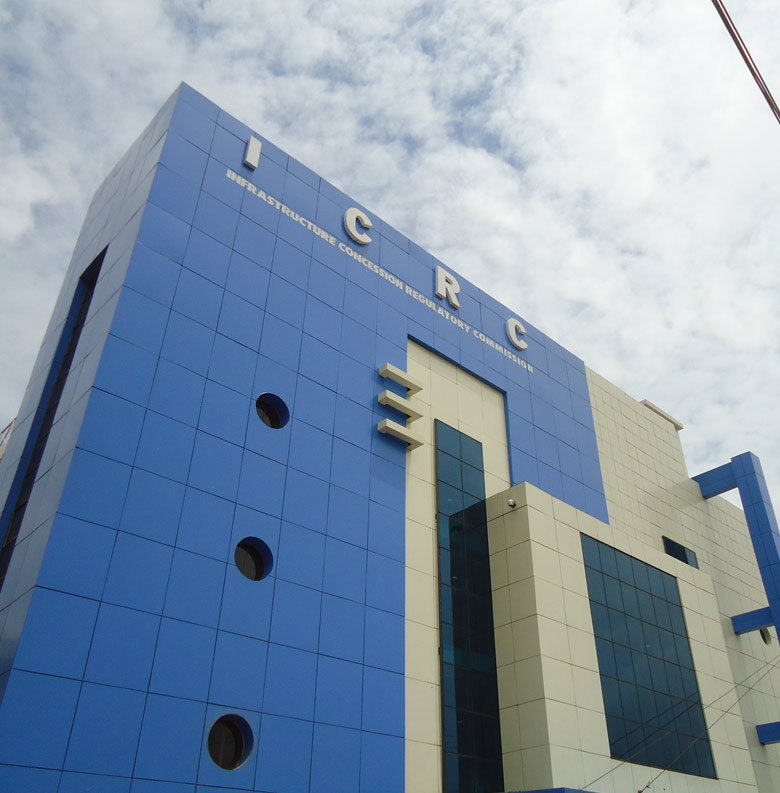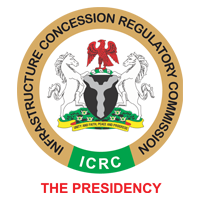
About ICRC
Infrastructure Concession Regulatory Commission

In 2008, the Federal Government of Nigeria established the Infrastructure Concession Regulatory Commission (ICRC) under the Infrastructure Concession Regulatory Commission (establishment, etc) Act, 2005.
The ICRC was established to regulate Public Private Partnership (PPP) endeavours of the Federal government aimed at addressing Nigeria’s physical infrastructure deficit which hampers economic development.
The pioneer Governing Body of ICRC was inaugurated on 27 November, 2008 by the late President Umaru Musa Yar’adua, GCFR. The pioneer Board had a former Nigerian Head of State, Chief Ernest Shonekan, as its Chairman and a seasoned technocrat, Engr. Mansur Ahmed, as its Director General from 2008 – 2012.
The immediate past ICRC Governing Board was constituted in August 2013 by former President Goodluck Jonathan, GCFR, with former Senate President, Dr. Ken Nnamani, GCON as the Chairman and Barr. Aminu Diko as the Director General from 2013 – 2017. Engr. Chidi K. C. Izuwah was the Director General from 2017 - 2021 after which Barr. Michael Aniku Ohiani took over from 2021 - July 2024.
Dr. Jobson Oseodion Ewalefoh is currently the Director General of the Commission. He was appointed and confirmed as Director General in July, 2024.
Mandate
The ICRC (establishment, etc) Act 2005 empowers the Commission to:
- Take custody of every concession agreement made under the enabling Act and monitor compliance with the terms and conditions of such agreement;
- Ensure efficient execution of any concession agreement or contract entered into by the Federal Government;
- Ensure compliance with the provisions of the ICRC Act;
- Perform such other duties as may be directed by the President, from time to time, and as are necessary or expedient to ensure the efficient performance of the functions of the Commission under the ICRC Act.
The enabling Act therefore mandates the Commission to manage the complex arrangements that the PPP process entails, as well as build capacity within MDAs to handle such arrangements themselves, subsequently.
The ICRC is also expected to monitor the implementation of such arrangements according to best practice, ensuring that the desired service standards are attained and maintained, value for money is assured and that the private sector operators are in a position to recoup their investment in a fair and equitable manner.
Scope
The scope of the Federal Government’s programme for PPP is the creation of new infrastructure and the expansion and refurbishment of existing assets at the federal level in the following areas:
- Power Generation and Transmission/Distribution Networks.
- Roads and Bridges.
- Ports.
- Railways.
- Inland Container Depots and Logistics Hubs.
- Gas and Petroleum Infrastructure such as Storage Depots and Distribution Pipelines.
- Water Supply, Treatment and Distribution Systems.
- Solid Waste Management.
- Educational Facilities (Eg, Schools, Universities).
- Urban Transport Systems.
- Housing.
- Healthcare Facilities.

ICRC’s Role In States’ PPP Programme
ICRC regulatory role pertains to Federal Government PPP programme. However a number of State Governments are using PPP to develop infrastructure and ICRC is willing to lend its technical expertise in developing an appropriate PPP framework for any State which so desires.Also, although each state is responsible for its own investment projects, many PPP projects within a State will be financed with the support of a guarantee by the Federal Government. In providing any such guarantees, the Government will have recourse to best practices as exemplified by the National PPP guidelines and regulations.
Objectives
The key strategic objective for the Infrastructure Concession Regulatory Commission (ICRC) is to accelerate investment in national infrastructure through private sector funding by assisting the Federal Government of Nigeria and its Ministries, Departments, and Agencies (MDAs) to implement and establish effective Public Private Partnerships (PPP) procurement.The main objectives of the ICRC includes:
- Building a pipeline of public infrastructure investment projects using the Ministries, Departments and Agencies that are high priorities for FGN and which can attract private sector investment.
- Ensuring that a robust, transparent, efficient and equitable processes is developed for managing the selection, development, procurement, implementation and monitoring of PPP projects and that this process is applied consistently to all relevant projects.
- Ensuring that the advantages and requirements of PPP’s are well appreciated at the National level amongst potential investors and by other relevant stakeholders.
Role / Functions
The role/functions of the ICRC are derived from the mandate and include:
- Promoting, facilitating, supporting and coordinating implementation of a sound PPP Process, while ensuring that principles of good governance are applied to all of the functions that form part of it;
- Providing guidelines and transaction support and building capacity in all Federal Government Ministries, Agencies and Departments (MDAs) for project development, tendering, negotiation and contract execution;
- Developing guidelines for monitoring contract compliance during construction, operation and contract termination and supporting the MDAs assigned to this task;
- Collaborating with other agencies, including similar state-level PPP units, to implement a cohesive national legal, policy and regulatory environment that is conducive to private sector investment in Nigeria’s infrastructure projects.



